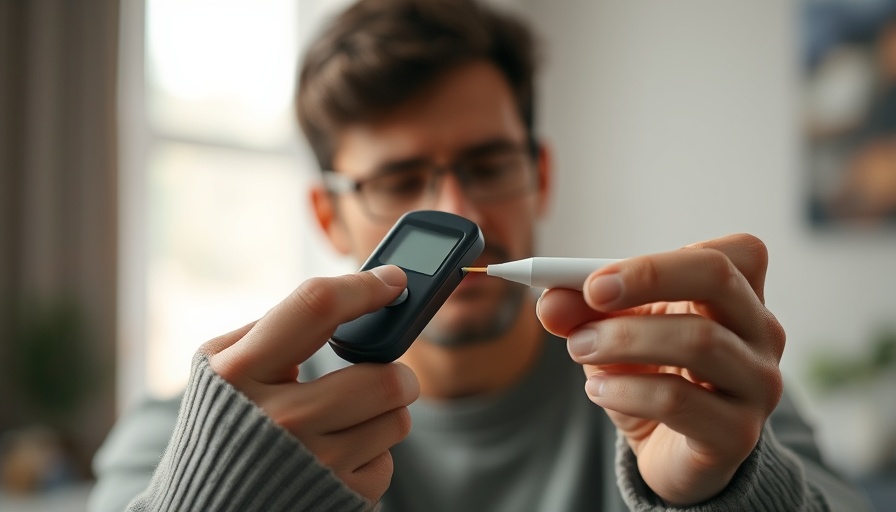
Understanding the Diabetes Epidemic: Awareness Is Key
Did you know that approximately 38 million Americans are living with diabetes? This startling figure emphasizes the importance of understanding this condition's nuances, risks, and management strategies. As informed citizens, being aware empowers us to prevent and manage diabetes effectively. In our quest for a healthier community, we need to dissect what diabetes is and why we should remain vigilant, especially if we or our loved ones are at risk.
In 'Understanding Diabetes: Risk Factors, Pre-Diabetes, and Blood Sugar Testing | Ask The Doc', the discussion dives into the complexities of diabetes, exploring key insights that sparked deeper analysis on our end.
What Is Diabetes and How Does It Affect the Body?
Diabetes is essentially a condition characterized by high levels of glucose in the blood. This usually happens when the pancreas either doesn’t produce enough insulin or the body becomes resistant to insulin’s effects. Consequently, the glucose remains in the bloodstream, leading to various complications. Long-term consequences can be severe, affecting vital organs such as the heart, kidneys, and even contributing to blindness. Understanding these effects underlines the critical importance of diabetes management and early intervention.
Identifying Risk Factors: Who Should Be Concerned?
Knowledge of risk factors is crucial in diabetes prevention. Individuals who are overweight, over the age of 45, or have a family history of the disease find themselves at greater risk. Additionally, lifestyle factors such as inactivity and unhealthy diets contribute significantly. Ethnicity can also play a part, as people of African-American, Hispanic, and American Indian descent are statistically more likely to develop diabetes. Recognizing these risk factors can alert individuals to take proactive measures in their lives.
Pre-Diabetes: A Warning Sign
Receiving a diagnosis of pre-diabetes can be alarming, but it doesn't mean diabetes is inevitable. It serves as an important warning sign, indicating the need for lifestyle changes. Incorporating healthy eating habits, increasing physical activity, and managing stress can greatly reduce the risk of progressing to diabetes. Remember, pre-diabetes is your body’s way of signaling that it needs you to intervene.
Effective Management Strategies: Taking Control
Support from family and friends can make a significant difference for those diagnosed with diabetes. For caregivers, understanding monitoring techniques—like how to use a glucose meter—enables you to be a supportive partner. Regular blood sugar checks, good record-keeping, and communication with healthcare professionals foster a health-conscious environment for the diabetic individual.
Exploring Treatment Options: Beyond Insulin
When discussing diabetes treatment, there's often a misconception that insulin is the only solution. While it can be essential for some individuals, various other treatments exist, from oral medications like Metformin to newer classes of medications that help manage diabetes symptoms. Equally important are lifestyle factors; adopting a healthy diet, maintaining a regular exercise routine, and ensuring ample sleep play a pivotal role in preventing and managing diabetes.
Reversal of Diabetes: Is It Possible?
There’s ongoing debate in the medical community regarding the possibility of reversing diabetes. While some experts argue that diabetes can never be fully cured, others point to cases where individuals have managed their condition effectively through dramatic lifestyle changes. For instance, engaging in a plant-based diet and committing to regular exercise may significantly enhance metabolic health, potentially reversing diabetes for some individuals.
Preparing for Hypoglycemia: A Safety Net
Unexpected drops in blood sugar, particularly in elderly individuals or those on certain medications, can lead to serious health incidents. It’s wise for caregivers and families to keep sugary snacks or drinks handy in case of emergencies. Awareness and preparation can safeguard against dangerous situations, ensuring that loved ones are well cared for.
The Importance of Gestational Diabetes Education
With many women experiencing gestational diabetes during pregnancy, understanding this condition is essential. Contrary to common misconception, it doesn't indicate pre-existing diabetes, but rather reveals that hormonal changes complicate insulin usage during pregnancy. Awareness and appropriate management can lead to healthy outcomes for both mother and baby.
For anyone seeking to better understand diabetes, from those recently diagnosed to those with family histories, arm yourself with the right information. Take proactive steps today! Whether it means tweaking your daily diet, committing to new workout routines, or scheduling an appointment for a checkup, there’s power in prevention.
In conclusion, health is a journey that requires continuous education and support. Understanding diabetes is more than viewing a disease—it's an opportunity to reclaim your health and share valuable insights with those around you. Don’t let diabetes define you; instead, let it inspire meaningful change.
 Add Row
Add Row  Add
Add 




Write A Comment